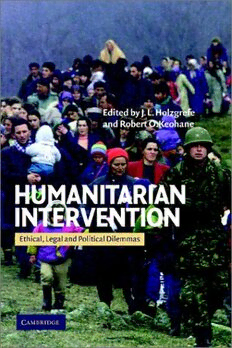
Humanitarian Intervention: Ethical, Legal and Political Dilemmas PDF
364 Pages·2003·1.75 MB·English
Most books are stored in the elastic cloud where traffic is expensive. For this reason, we have a limit on daily download.
Preview Humanitarian Intervention: Ethical, Legal and Political Dilemmas
Description:
The genocide in Rwanda showed us how terrible the consequences of inaction can be in the face of mass murder. But the conflict in Kosovo raised equally important questions about the consequences of action without international consensus and clear legal authority. On the one hand, is it legitimate for a regional organization to use force without a UN mandate? On the other, is it permissible to let gross and systematic violations of human rights, with grave humanitarian consequences continue unchecked? (United Nations Secretrary-General Kofi Annan). This book is a comprehensive, integrated discussion of `the dilemma' of humanitarian intervention. Written by leading analysts of international politics, ethics, and law, it seeks, among other things, to identify strategies that may, if not resolve, at least reduce the current tension between human rights and state sovereignty. Humanitarian Intervention is an invaluable contribution to the debate on all aspects of this vital global issue. J.L. Holzgrefe is a Visiting Research Scholar in the Department of Political Science, Duke University. He is a former Lecturer in International Relations at the University of St. Andrews, Scotland, and visiting scholar at the Center of International Studies, Princeton University, the Center for International Affairs, Harvard University, and elsewhere. He was educated at Monash University, Australia and Balliol College, Oxford. He has published on the history of international relations thought. Robert O. Keohane is James B. Duke Professor of Political Science, Duke University. He is interested in the role played by governance in world politics, and in particular on how international institutions and transnational networks operate. He is the author of After Hegemony: Cooperation and Discord in the World Political Economy (Princeton, 1984), for which he was awarded the second annual Grawemeyer Award in 1989 for Ideas Improving World Order. He is also the author of International Institutions and State Power: Essays in International Relations Theory (Westview, 1989), co-author of Power and Independence: World Politics in Transition (Little, Brown, 1977; 3rd edition 2001), and co-author of Designing Social Inquiry: Scientific Inference in Qualitative Research (Princeton, 1994). He is a fellow of the American Academy of Arts and Sciences and has been the recipient of a Guggenheim fellowship.
See more
The list of books you might like
Most books are stored in the elastic cloud where traffic is expensive. For this reason, we have a limit on daily download.
